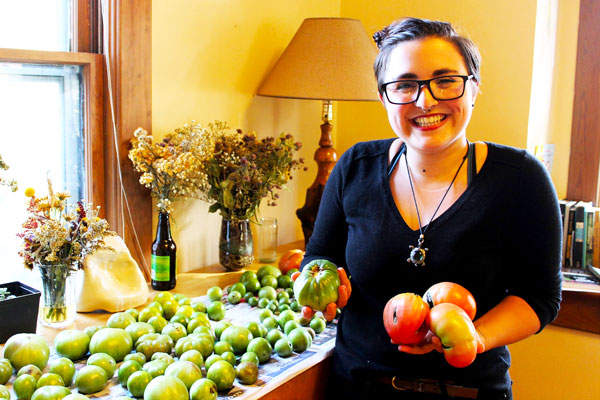On a cool autumn evening, with a guest on hand to watch her at work in the kitchen, Naomi Gross, a senior, surveyed the counter top. The surface was covered in produce: celery, tomatoes, onions, and plenty of apples. This sight may seem challenging to some, however Gross greatly enjoys the process of cooking.
Some of the vegetables had begun to show signs of going bad, from insects here and small rot there. Fortunately, she said, all of it was free.“Normally we get most of the food we use to cook with from the corner garden on 9th Street, but most of this is from the dumpster,” she explained, referencing the dumpsters behind local grocery stores, like Aldi and Kroger.
The 9th Street Garden came about last year when Cecelia Lapp-Stoltzfus, a senior, Hannah Yoder, a junior, and Gross raised sprouts during the winter in Kenwood. The following spring, they planted a variety of produce, including arugula, onions, raspberries, tomatoes, kale, and spinach.
The most promising ingredient on the table this evening was a bunch of crisp, red apples. Gross decided she wanted to bake some sort of apple cake, playing with the ideas of an apple upside-down cake and a tarte tatin. She settled on the upside-down cake and got to work cutting the apples into thin, serviceable slices.
Gross described four distinct phases in her growth into someone with an interest in the cooking world. It started with her grandmother, who emphasized proper hosting skills. To her, this meant providing an array of food for her guests to enjoy.
As Gross began picking up cooking around fourth grade, taking after her grandmother, she recalls her mother wanting to be sure that her daughter understood the ethics of food.
“I love cooking because it’s a way to get people excited about food,” she said. “It’s an easy way to get people talking and thinking about where their ingredients come from, and some of the injustices when it comes to food around the world. Ethical eating requires an intentionality about the food you use and eat.”
After artfully arranging apples into the two tins she would use for the cakes, she made a quick caramel out of ginger, sugar, cinnamon, water, butter, and sugar over the stove.
She explained that this observance of where her food would come from prompted her to go through a vegan phase, which is still a foundation for most of her cooking. She was a vegan throughout high school and most of college, trying to have her dishes accessible to all, including those who are vegan or gluten-free.
Through SST and other travels, she added to her love of cooking the appreciation of cultural context and methodologies of dishes.
“In Senegal, I learned that process is very important,” she said. “If you don’t cut the onion correctly, the whole dish can be ruined. So, I know how to cut an onion about 25 different ways now!”
She demonstrated one such method, pantomiming the cutting of an onion in a star shape in the palm of her hand. She then cut the onion in half horizontally, producing imaginary tenths of an onion.
Culture is something that Gross values greatly in her cooking. Again, food is a way to cross boundaries and build community. Her personal favorite style of food to cook is Persian. She explained that it’s imperative to be aware of intercultural settings and being hospitable.
Gross even considered pursuing culinary school, much to her parents’ distress. However, she was turned off of the idea because of the state of much high-class cooking, especially in the U.S.
“People obsess over cross-cultural cooking, especially in the chef industry,” she said as she traced circles in some parchment paper to use for flipping the cakes over. “I constantly see top chefs in many areas claiming a style of food based in some other culture, and claim it as the best in the world. It’s a kind of appropriation that isn’t talked about.”
After the apples are in place on the parchment paper, Gross creates the cake batter to use for the bottom of the cake. At this point, most of the work has been done and she is nearly ready to put her creations in the oven until they develop the crisp, golden brown signs of doneness.
Gross gets excited about the culture and logistics of food, but her favorite part is still the process. “I love the challenge of having ingredients and figuring out what I’m going to do with them,” she said.
For some, this could be the most difficult and aggravating part. But for others, like Gross, it is the aspect of cooking that gives her satisfaction.
The upside-down cakes came out of the oven, sweet combinations of apple, cinnamon, and caramel, the perfect beginnings of fall desserts.



